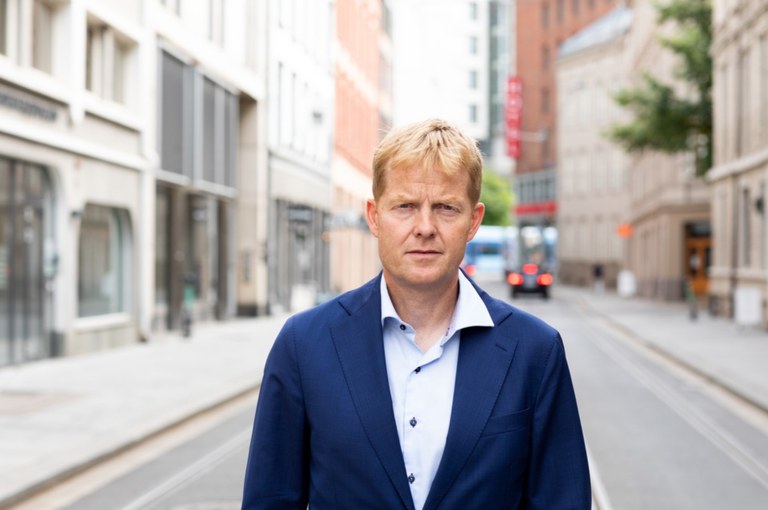Renewed drive to fight work-related crime in the Nordics
All of the Nordics have intensified the fight against work-related crime. Norway’s new government has launched what it calls a spring clean of the Nordic labour market. Sweden’s deputy Minister for Employment Johan Danielsson has been tasked with coordinating the policy, and recently visited Oslo where he met his Norwegian colleague Marte Mjøs Persen.
All of the Nordics have intensified the fight against work-related crime. Norway’s new government has launched what it calls a spring clean of the Nordic labour market. Sweden’s deputy Minister for Employment Johan Danielsson has been tasked with coordinating the policy, and recently visited Oslo where he met his Norwegian colleague Marte Mjøs Persen.
Norway has had special “a-crime centres” since 2015, where the Labour Inspection Authority, Labour and Welfare Administration NAV, police and tax authorities work side by side. They also carry out joint workplace inspections. Johan Danielsson started his Oslo visit by going to the a-crime centre in Schweigaardsgate.
“The most important thing we learn from both the a-crime centres and the Norwegian Ministry of Labour is that it works. Housing all the authorities together means more and improved inspections, while new types of crime are uncovered,” Johan Danielson tells the Nordic Labour Journal, after also taking part in the annual black market conference organised by the Norwegian Union of Municipal and General Employees and the NTL trade union.
Sweden will open two anti work crime centres in June and another five in 2023. Nine different authorities will share physical offices.

Johan Danielsson has as Deputy Minister for Employment been responsible for coordinating the fight against work-related crime. Photo: Joakim Pohl/ Regeringskansliet.
“Since 2018, Sweden has also carried out joint inspections, 6,000 of them so far. They work well and have uncovered an enormous amount of cheating. Half of the workplaces that have been inspected have received notifications and immediate action had to be taken in one in four. In some of the workplaces, 20% of the workers did not even have the right to stay in Sweden,” says Johan Danielsson.
He offered the Oslo black market conference a succinct message for what needs to be done:
- It must become harder to cheat
- It must become easier to be caught
- Sanctions will be tougher
At the extreme end of work-related crime – when dealing with organised crime and mafia activity – the authorities can share information with each other so that data from different records can paint a more comprehensive image of the criminal activity.
“Parallel with opening up the regional centres against work-related crime, we have tasked the authorities with developing their own methods for fighting such crime. We will also introduce legislation to remove unnecessary secrecy obstacles,” says Johan Danielsson.
Society pays a lot for work-related crime
Several of the speakers at the black market conference pointed out that work-related crime costs society four to five times as much as ordinary crime. But there is a lot of uncertainty. The Norwegian government’s strategy against work-related crime refers to a 2017 analysis showing the total cost to society could be anything between 28 to 108 billion Norwegian kroner. The lowest figure represents 1.2% of Norway’s GDP.
Work-related crime is a wide-ranging term, covering everything from tax evasion to what can be described as modern-day slavery. Norwegian trade unions also want to talk about “company crime” which encompasses everything of an illegal nature that a company can do.
“We have gradually managed to include the term ‘wage theft’ into the debate, but there is still very little talk about ‘company crime’,” Mette Nord, head of the Union of Municipal and General Employees, told the conference.
To broaden the debate, the American professor, author and filmmaker Joel Bakan was also invited to the conference. One of the things he is known for is launching the term “corporations as psychopaths”.
 “Visit any company website today and you would be excused for thinking you have come to a voluntary organisation. Because what is written about the company is that they will become 100% carbon-neutral and there are long deliberations about all the green and social programmes they have. Exactly like psychopaths, they have discovered that the best way of reaching their goals is to be charming,” said Joel Bakan.
“Visit any company website today and you would be excused for thinking you have come to a voluntary organisation. Because what is written about the company is that they will become 100% carbon-neutral and there are long deliberations about all the green and social programmes they have. Exactly like psychopaths, they have discovered that the best way of reaching their goals is to be charming,” said Joel Bakan.
He does not believe companies will ever do anything other than what their goal is: to create more value.
“Companies only do good deeds because it benefits themselves,” he said.
Crime committed by some of the largest companies centres on billions of dollars, the environment and human rights.
“This is about Volkswagen cheating on their car emissions, it is about BP and the Deepwater Horizon blowout, about how Facebook invades your private life and how Google is in breach of monopoly legislation,” said Joel Bakan
The larger, the more difficult
The larger the company, the harder it is to bring them to justice. But the problems in more day-to-day work-related crime are the same. Even smaller companies now set up complicated structures across several countries in order to cover their tracks. Tax havens are as much about becoming anonymous as it is about avoiding taxes. But according to Joel Bakan, there is also a need to change the way in which we look at companies’ responsibilities.
“When authorities want to punish companies, they are told that ‘companies are not human beings'. They cannot, therefore, be punished because they have no soul or body, just like we cannot punish cars, dogs or stones. Companies have no human will or intent, both of which are important prerequisites for criminal law.
“When authorities try to punish the owners instead, it is the opposite. Then we hear that they cannot be punished because the company is responsible,” said Joel Bakan.

Pål K Lønseth is the head of Norway's economic crime authority Økokrim.
One of the largest ever court cases against a company seen in Norway was in 2004, when oil rig company Transocean was accused of withholding 11 billion kroner (€1.14bn) in tax. Ten years later the case ended with a total collapse for the financial police and the company was acquitted.
“Investigating the crimes of a benefit scrounger and a multi-national company are two separate worlds,” underlined the head of economic crime authority Økokrim Pål K. Lønseth.
“After the 2001 terror attacks in the USA, the country took a quantum leap when it comes to tax havens and access to information there.”
Once more in the spotlight
The issue of how society should react against economic crime is again in the spotlight because of the sanctions against Russian oligarchs after the invasion of Ukraine.
“But finding out what Russian oligarchs own or who really owns a certain property is still not done overnight.”
He does not believe new legislation is what is needed, however.
“What we need is the capacity to investigate what is already criminal.”
And often the punishment is not proportional to the crime.
“We can, besides issuing fines, also seize part of the profit that comes from company crime. But to do this, you need big resources. In Norway we have a long tradition for investigating what crime has been committed,” says, säger Pål K Lønseth.
“However, after that, the investigators often stop because so much is needed in order to prove what the gain has been from the criminal acts.”
- Facts
-
The Swedish government has asked the Public Employment Service, the Work Environment Authority, the Economic Crime Authority, the Social Insurance Agency, the Gender Equality Agency, the Migration Board, the Police Authority, the Tax Agency and the Prosecution Authority to work together during 2022 and 2023 to fight work-related crime.
- Big inspection
-
By coordinating their resources, the Norwegian Police, Labour Inspection Authority, customs, the Public Roads Administration and the Labour and Welfare Administration can carry out large inspections, like the one above. More than 5,000 cars and trucks were checked in a few hours, and 54 vehicles lost their licenses in one go.
"Inspecting heavy vehicles and professional drivers is meant to make roads safer and to get rid of the worst drivers who not only undermine Norwegian transport workers on price, but who are also a real danger in traffic," said head of the NTF trade union Lars M. Johnsen.
 Follow us on Facebook
Follow us on Facebook
